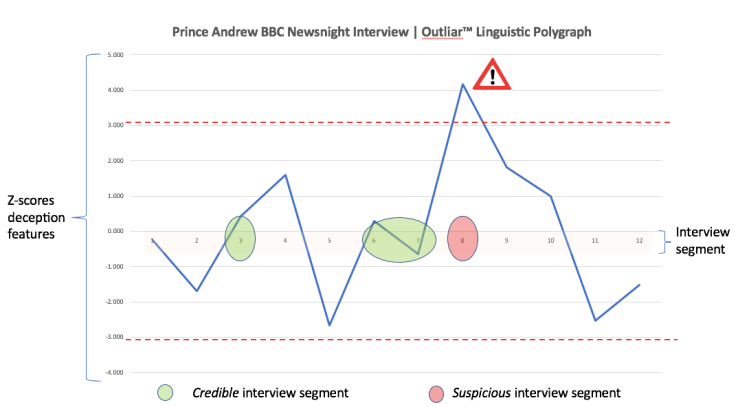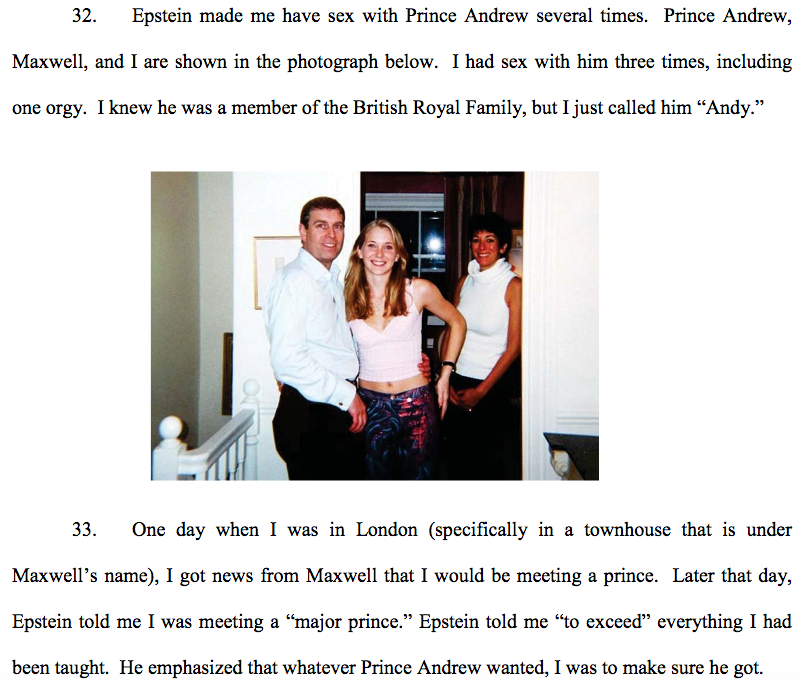 The Duke of York interviewed by Emily Maitlis on Newsnight (©BBC 2019)
The Duke of York interviewed by Emily Maitlis on Newsnight (©BBC 2019)
HRH Prince Andrew, the Duke of York, was interviewed by Emily Maitlis in a BBC Newsnight special broadcast on 16 November. The topic of the interview was Prince Andrew’s relationship with Jeffrey Epstein, a billionaire and convicted pedophile who died in prison whilst being investigated for multiple sex trafficking charges. Prince Andrew was also asked about allegations made by Virginia Giuffre (neé Roberts), one of the women who claimed to have been trafficked and abused by Epstein and his partner Ghislaine Maxwell. Giuffre testified under oath in a 2015 court deposition that she had been trafficked to Prince Andrew by Epstein and his partner Ghisliane Maxwell, and that she had “engaged in sexual activities” with Prince Andrew on three occasions.
Top: Extract from Virginia Roberts Giuffre 2015 court deposition. Below: Prince Andrew and Jeffrey Epstein in Central Park in 2010.
Newsnight negotiated the interview with Buckingham Palace over a six-month period. After initially refusing an interview with Newsnight in May due to a reluctance to talk about Epstein, Prince Andrew and Buckingham Palace agreed to the interview after Epstein’s death in August (see GQ interview with Newsnight producer Sam McAlister ).
Prince Andrew and the palace agreed that no questions regarding the Epstein-related allegations would be off limits; neither were questions agreed in advance. Considering these circumstances of the interview, it seems possible that Prince Andrew was motivated by a desire to clear his name. It is also likely that Buckingham Palace were convinced that the allegations made against Prince Andrew were false. These circumstances point to a strong desire to appear credible and justify a presumption of truth.
Outliar™ ‘Linguistic Polygraph’ Methodology
Outliar™ Linguistic Polygraph is based on principles of deceptive communication drawn from Information Manipulation Theory (McCornack et al. 2014): that lies are built on truth and therefore deception most often produces texts that are a strategic mixture of truth and lies. Using this insight, the Outliar™ methodology utilizes the most sensitive linguistic deception cues (LDCs) drawn from the academic literature (see Hauch et al. 2015 for a good overview), as well as LDCs used on investigator training programmes, in order to identify and separate credible and suspicious content (see Popoola (2017) for a case study). Disclaimer: Outliar™ is not a lie detector. It is an investigative linguistic tool that highlights credible text segments and identifies suspicious text segments as ‘points of interest’ deserving further investigation i.e. loci of potential deception.
Prince Andrew’s Interview

Credible interview segments
Segment 3: This is Prince Andrew at his most reflective. He admits that he thought visiting Epstein after his conviction was honourable rather than inappropriate (“I felt that doing it over the telephone was the chicken’s way of doing it” lines 167-168); he notes that he took the decision to visit Epstein himself and against the advice of at least some of his team (“I had a number of people counsel me in both directions…“). Reflective engagement with different perspectives and self-questioning is a cognitively complex stance that is difficult to maintain during deception.

Segments 6 and 7: These contain a host of ostensibly verifiable details – information about a Pizza Express visit (lines 371-375); details of a medical condition that prevents sweating (lines 387-393), the kinds of clothes he usually wears when traveling (lines 470-472). In the age of ‘deep fakes’, even his skepticism as to the provenance of the photograph with a 17-year old Virgina Roberts (see above) comes across as reasonable (lines 476-477). As well as verifiable facts, Prince Andrew provides reasons and explanations; all this adds to the credibility


Suspicious interview segments
Prince Andrew’s language register shifts significantly in Segment 8; his coherence disappears and he becomes increasingly vague. Up until this point, he has been able to somewhat plausibly deny specific occasions of meeting Virginia Roberts; however, he is unable to convincingly deny knowing Virginia Roberts at all. Prince Andrew doesn’t offer any reasons for not knowing her or concessions towards the fact that people might think he has met her. This runs counter to the reflective and conciliatory register of the remainder of the interview.

In general, liars don’t like to directly speak lying words. Here, each of Prince Andrew’s propositions in lines 577-580 – ‘I don’t remember meeting her, ‘I don’t remember a photograph being taken’, ‘I’ve said [many times] that we never had…sexual contact’ – can be taken literally as true (i.e. not remembering, saying something frequently). However, this is a key difference between lying – speaking falsehoods – and deception i.e. creating false belief; deception is often executed through exploiting presupposition and perceived credibility cues – without explicitly stating false facts. A more credible answer would include a concession (e.g. “I wish I could remember”) or explanation (e.g. “I rarely, if ever, have met young girls in a casual setting so it’s extremely unlikely…”).
This segment of the interview is particularly awkward for two further reasons. Firstly, Prince Andrew pattern of register change indicates a strong distancing strategy; Andrew literally puts a barrier between himself and Virginia Roberts (“I don’t have a message for her because I have to have a thick skin”, line 589), and quite disparagingly refers to Roberts as just “somebody making allegations”(lines 589-90). This negativity is in stark contrast to the tone of the interview up until now. Liars are more likely to express unmoderated negativity when omitting pertinent information (whereas they become more verbose and personal when exaggerating or falsifying). Secondly, Prince Andrew’s suggestion that a man always remembers having sex because it is a “positive act” is vague and unconvincing; Andrew is trying to emphasize the extent to which he doesn’t remember; it is difficult to prove a negative i.e. that you don’t remember something (just as it is difficult to disprove a negative).
It is most suspicious that Prince Andrew does not address the second half of Maitlis’ double-question: “Is there any way you could have had sex with that young woman or any young woman trafficked by Jeffrey Epstein in any of his residences?” (line 594) . In answer to this question, Prince Andrew’s persistent use of the ‘it’ pronoun to refer to the Virginia Roberts alleged incident than more general allegations is clear avoidance of the second part of Maitlis’ question.
Summary and Postscript
Andrew’s denial of any knowledge of the existence of Virginia Roberts is unconvincing. Questions about her motivation are denied vociferously but incoherently and with negativity and lack of engagement. This is out of step with the general register of the interview which has a reflective and considered (prepared?) tone. Although Prince Andrew may not have had sex with Virginia Roberts, he is likely to have more information on why she might be making these allegeations.
The photograph below, of Prince Andrew and Jeffrey Epstein on a yacht with a number of scantily-clad young females, indicates that the aforementioned unanswered question may be a key to the Prince Andrew – Epstein mystery.
Prince Andrew with Jerry Epstein. Phuket, 2001. Credit: Jason Fraser
Prince Andrew Newsnight Interview with Emily Maitlis – Transcript




[…] Prince Andrew, Duke of York, on several occasions. Both vehemently deny the claims until this day (see Prince Andrew Newsnight interview analysis blog). Roberts giving testimony under oath to a Florida Court and had legal […]
LikeLike